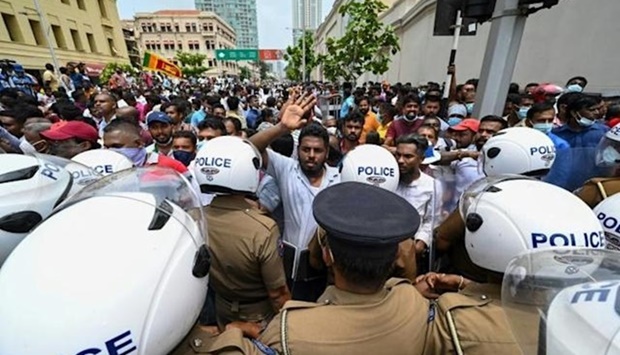Fresh protests erupted in Sri Lanka's capital on Tuesday, defying a government curfew after five people died in the worst violence in weeks of demonstrations over a dire economic crisis.
Demonstrators showed no sign they would back down, even after scores were injured when government supporters were bussed into Colombo on Monday, and attacked protesters with sticks and clubs.
As outrage over the incident soared, prime minister Mahinda Rajapaksa resigned -- but even that has failed to calm public anger, with his brother Gotabaya still president with widespread powers and command over the security forces.
Thousands of angry protesters stormed Mahinda's official residence overnight, and the former premier had to be rescued in a pre-dawn military operation on Tuesday, firing tear gas and warning shots.
"At least 10 petrol bombs were thrown into the compound," a top security official told AFP.
Speaking to AFP, protester Chamal Polwattage said: "More people are coming to the demonstration site after the emergency and curfews.
"People are angry about the attacks launched against us yesterday. Despite the curfew since yesterday afternoon, we have a lot of volunteers bringing food and water for us," the 25-year-old said.
"We will not go until the president goes," he added.
- Grip on power -
The Rajapaksa clan's hold on power has been shaken by months of blackouts and shortages in Sri Lanka, the worst economic crisis since it became independent in 1948.
But Monday's attacks on the protests represented a turning point after weeks of peaceful demonstrations.
"We were hit, the media were hit, women and children were hit," one witness told AFP, asking not to be named.
On Monday, police fired tear gas and water cannon to disperse crowds and declared an immediate curfew in Colombo, a measure later widened to include the entire South Asian nation of 22 million people.
Authorities said the curfew will be lifted Wednesday morning, with government and private offices, as well as shops and schools, ordered to remain shut on Tuesday.
Police and the local human rights commission said they have started separate investigations into Monday's violence.
"Arrest those responsible for instigating violence irrespective of their political standing," police chief Chandana Wickramaratne said in an order.
The United Nations condemned the escalating violence, with human rights chief Michelle Bachelet calling on the authorities to prevent further unrest.
"I am deeply troubled by the escalation of violence in Sri Lanka after supporters of the prime minister attacked peaceful protesters in Colombo yesterday May 9 and the subsequent mob violence against members of the ruling party," Bachelet said in a statement on Tuesday.
- Shot dead -
Despite the curfew, there were flare-ups of violence in Colombo and around the country, against both protesters and government supporters.
Angry crowds set alight the homes of at least 41 pro-Rajapaksa politicians, along with some vehicles, while buses and trucks used by the government loyalists were also targeted.
Several Rajapaksa homes were torched in different parts of the country, while a family museum in their ancestral village was trashed including life-size wax figures of their parents.
Outside Colombo, ruling party lawmaker Amarakeerthi Athukorala shot two people -- killing a 27-year-old man -- after being surrounded by a crowd of anti-government protestors, police said.
"He then took his own life with his revolver," a police official told AFP by phone.
Athukorala's bodyguard was also found dead at the scene, police said.
Another ruling party politician who was not named opened fire on protesters, killing two and wounding five in the south, police added.
Doctors at the main Colombo National Hospital intervened to rescue wounded government supporters, with soldiers breaking open locked gates to ferry in the wounded.
"They may be murderers, but for us they are patients who must be treated first," a doctor shouted at a mob blocking the entrance to the emergency unit.
- Unity government? -
In another sign of rapidly deteriorating security, vigilante groups blocked on Tuesday the main road to Colombo's airport and stopped all traffic to check for any Rajapaksa loyalists trying to leave the island, witnesses said.
Despite the attack on his residence, Mahinda Rajapaksa's son Namal told AFP that his father would not flee, describing the surge of national anger against his family as a "bad patch".
The 76-year-old said he was resigning to pave the way for a unity government.
But it was unclear if the opposition would join any administration with Gotabaya still president.
Under Sri Lanka's political system, even with a new unity government, the president will have the power to appoint and fire ministers as well as judges, and enjoy immunity from prosecution.
Opposition parties said Tuesday they called off unity talks with the government after the outbreak of violence.
But political sources said attempts were underway to arrange an online meeting between the president and all political parties.
The main opposition SJB said they were still considering their options.
"Unless President Rajapaksa steps down, no one -- whether the masses in the streets or key political stakeholders -- will be appeased," analyst Michael Kugelman from the Wilson Center told AFP.
The protests came after the coronavirus pandemic hammered the island's vital income from tourism and remittances, which starved the country of foreign currency needed to pay off its debt.
This forced the government to ban many imports, leading to severe shortages, inflation and lengthy power blackouts.
In April, Sri Lanka announced it was defaulting on its $51 billion foreign debt. It is in talks with the International Monetary Fund for a bailout.

